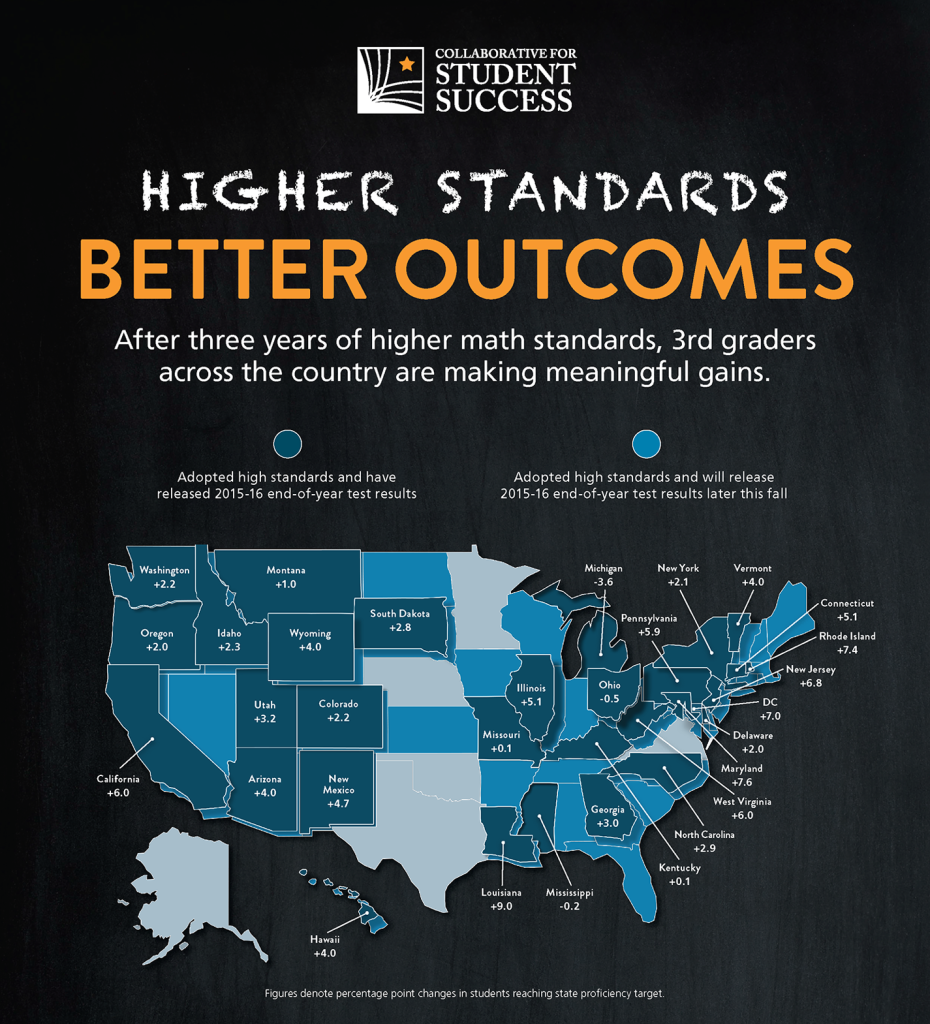Could “I’m not a math person” become a thing of the past?

Students across the United States are making meaningful gains. A huge amount of credit goes to teachers, parents, and students for the hard work they’ve put in. However high standards have played an important role too!
As Jim Cowen explained last week, the results from 2016 assessments “suggest that the promise of higher academic standards—whatever they may be called—is working.”
One particular trend that I’d like to point out is the notable gains in third grade math achievement across states that adopted high standards a few years ago.
Most states began implementing new, higher standards between 2012 and 2014. While most of the current students were part-way through their academic careers when this switch to high standards happened, this past year’s third graders were just arriving in Kindergarten. So, students who just finished third grade from those states have only ever known learning under these higher expectations. And their math scores three years later are seriously looking good.
Take a look at the map:

California, Louisiana, Arizona, Illinois, DC, New Jersey, Rhode Island, and many more — all made significant gains in math proficiency for third graders in 2015-2016. Put another way, despite all the concerns of “fuzzy math,” more 3rd graders this year were proficient than the year before, and the year before that.
So what lead to this increase in math in particular?
Along with the traditional methods you and I learned in school, these young students were learning multiple approaches to a simple problem, allowing them to grasp the underlying concepts by using the method that worked best for them. Math experts agree that this approach is key to getting kids more comfortable with math, so as they grow up, they are ready to tackle more difficult concepts.
While math proficiency is climbing, we’ve still got a long way to go as a nation. But we are hopeful.
You don’t often hear an adult say “I’m not a literate person,” but you hear “I’m not a math person” all the time. At the Collaborative we’re hoping the nation is on track to make “I’m not a math person” a thing of the past.
Spread the word: Share these results on Facebook!
Adam Ezring is the Director of Policy at the Collaborative for Student Success
About the Collaborative for Student Success
At our core, we believe leaders at all levels have a role to play in ensuring success for K-12 students. From ensuring schools and teachers are equipped with the best materials to spotlighting the innovative and bold ways federal recovery dollars are being used to drive needed changes, the Collaborative for Student Success aims to inform and amplify policies making a difference for students and families.
To recover from the most disruptive event in the history of American public schools, states and districts are leveraging unprecedented resources to make sure classrooms are safe for learning, providing students and teachers with the high-quality instructional materials they deserve, and are rethinking how best to measure learning so supports are targeted where they’re needed most.

